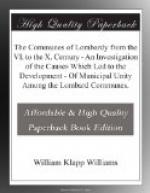It is here we see the weakness of those writers who insist upon the continuance of the Roman curia in the municipalities of the Lombard kingdom. They seize upon a few names, relics of Roman rule, and from them generalize a complete system of taxation and administration. That the existence of any such system is alike contrary to fact and to the whole nature of the Lombard people, any critical and impartial study of the sources of government revenues at this time will make clear. It would be out of place to burden a paper of this character with the results of a minute investigation into the fiscal relations of the rulers and the people when this has no immediate connection with the development of municipal government; but I will state that a careful examination of all available sources, including documents and statutory enactments, both public and private, reveals, to my mind, a theory and a system of raising the revenues of the state closely allied in both principle and detail to feudal forms and feudal ideas, and having little in common save the names of a few of its officers, with the ancient methods of collecting the taxes peculiar to the Roman municipal constitution.[41]
In general terms, the collectors of the revenues were called telonarii, or actores, exactores or actionarii, etc., and the taxes they collected were the usual feudal dues, fines, forfeitures, compositions for service, etc. The nomenclature of these various officers and of the different duties they had to levy, varying as it did with regard to locality, and more especially with regard to time—the Franks introducing an entirely new set of names for institutions often identical in character to those displaced—presents an amount of confusion which, fortunately, it is not necessary for us to endeavor to penetrate; but, having stated the foregoing general conviction with regard to the fiscal system, we will now pass on to a consideration of some of the lesser offices held within each civitas by the deputies and subordinates of the dux. These, of course, were connected, in degrees more or less close, with the different curtes regiae, and with the placita held in the various civitates commonly about three times in the year. Some of the officers, like the vice-comes found to have existed in many localities, are simply deputies of the dux, or representatives of his person, and hold their office simply by virtue of his will and under a somewhat arbitrary tenure; others, like




